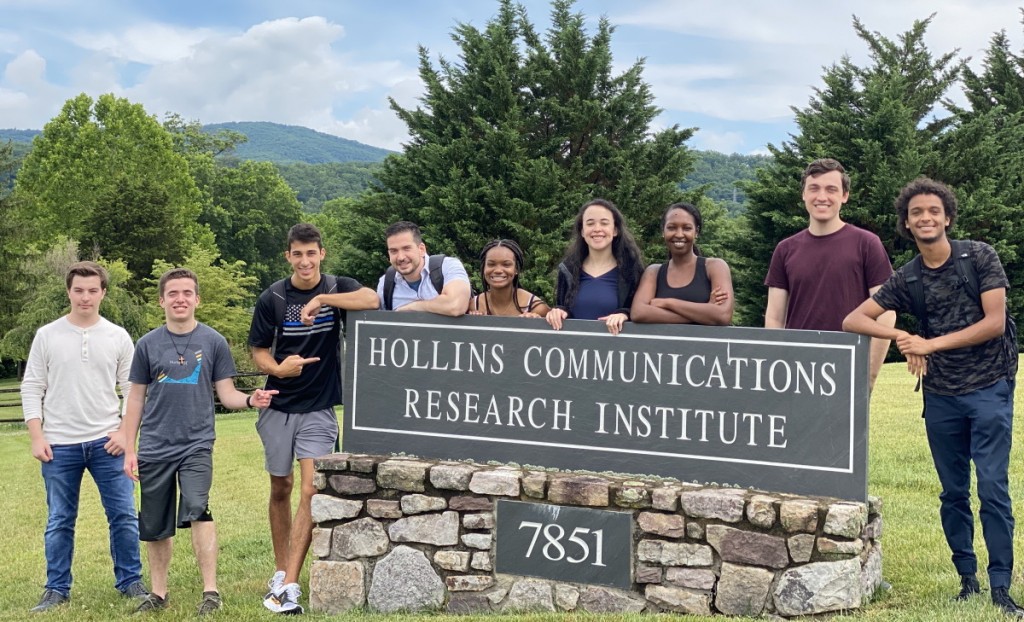– H C R I N E W S R E L E A S E –
Roanoke, VA, October 4, 2022… Hollins Communications Research Institute (HCRI), a nonprofit center dedicated to stuttering research and treatment innovation, accomplishes another milestone with the center turning 50 years old this month.

Rather than take time to celebrate, HCRI Founder and President Ronald L. Webster, Ph.D. and his team are looking to the future and the opportunities that lay ahead. In addition to extensive planning, the team is continuing to conduct research on stuttering and further hone HCRI’s award-winning stuttering therapy program.
What started in 1972 as a small stuttering research and therapy operation in Roanoke, Virginia has evolved into an international center that has treated thousands who stutter with one of the most sophisticated and successful treatment programs available today.
Grounded in science, HCRI’s 12-day stuttering therapy involves systematic instruction by specially trained clinicians who guide participants through each therapy step. Clients utilize HCRI’s advanced technology and a proprietary app during treatment to make fluency skill learning easier and more exacting. When clients return home, they are provided with a comprehensive package of post-therapy support.
Research demonstrates 93% of HCRI stuttering therapy participants achieve fluency by the end of their 12-day program. Follow-up studies reveal that 75% maintain fluent speech when evaluated two years later. These fluency results are among the highest documented outcomes of any stuttering therapy.
“Stuttering limits educational, career and social opportunities. When individuals acquire skills to control their stuttering, new doors of opportunity open. The ability to speak fluently and confidently transforms lives,” Dr. Webster said.
Approximately 66 million people worldwide suffer from stuttering, with three million in the U.S. The condition is characterized by repeated or prolonged sounds, syllables, blocks and words that disrupt speech.

According to Dr. Webster, “the problem with stuttering is that stuttering is not the problem.” At the heart of the stuttering problem is the faulty speech muscle contractions that occur within the speech production system. Speech organs are forced into positions that are wrong for saying the intended sounds. Stuttering occurs as a downstream result of muscle events going wrong earlier in time.
These faulty speech muscle activities are addressed directly within the HCRI therapy system. Once participants are taught new ways to use their speech muscles, they acquire the ability to control their stuttering and speak fluently.
HCRI is recognized for its many accomplishments, awards and “firsts” related to stuttering treatment.
“Our ongoing research focuses on increasing knowledge of stuttering as a physical condition – and uncovering new insights to effective treatment,” Dr. Webster added.
This includes understanding the role genetics plays in stuttering. HCRI partnered with the National Institute on Deafness and Other Communication Disorders (NIDCD) on a pioneering study that discovered three mutant genes linked to stuttering.
HCRI has conducted follow-up studies on the genetics of stuttering, including participating with the NIDCD on the first study to evaluate stuttering therapy outcomes among those with and without mutant genes for stuttering.
Looking to the Future
HCRI has a full slate of initiatives planned for the near future.
- Genetics-Driven Therapy – HCRI will delve deeper into the genetics of stuttering and examine the possibility of customizing therapy for different mutant gene carriers.
- Anxiety and Speech – The institute’s team will research the effects of anxiety related to speech performance in therapy and identify ways to reduce the impact of anxiety during treatment.
- Research Partnerships – HCRI seeks to establish new partnerships for cooperative research on stuttering. One of the efforts includes using brain scan technology to identify brain activity before, during and after therapy.
- Children and Stuttering – Studies focused on children who stutter are in the planning stages and may lead to exciting new ways to help kids learn to speak fluently with greater ease and efficiency.
- Remote-Access Stuttering Therapy – To make therapy more accessible, HCRI will test the feasibility of remote access therapy that maintains the same rigorous quality standards as the center’s in person program.
“The future holds exciting promise. We look forward to the next 50 years of making a real difference in the lives of persons who stutter,” Dr. Webster said.
More About HCRI
HCRI was established in 1972 by Dr. Webster to investigate stuttering through scientific discovery and treatment innovation. Virginia-based HCRI, a 501(c)(3) charitable organization, has become a leader in stuttering research and the development of scientifically derived therapy approaches.
More than 7,000 people from across the U.S. and 50 countries have come to HCRI for stuttering treatment. Clients come from all walks of life and include teachers, business professionals, athletes, broadcasters, engineers, musicians, students, doctors, military personnel, police officers, actors, a Supreme Court nominee, and even royalty.
The institute is located at 7851 Enon Drive, Roanoke, Virginia 24019. For more information, visit www.stuttering.org or call (540) 265-5650.


.jpg)